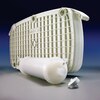ABS1627 Sigma-AldrichAnti-CTGF Antibody, N-Term Antibody
This Anti-CTGF Antibody, N-Term Antibody is validated for use in Western Blotting, Neutralizing for the detection of CTGF.
More>> This Anti-CTGF Antibody, N-Term Antibody is validated for use in Western Blotting, Neutralizing for the detection of CTGF. Less<<Recommended Products
Overview
| Replacement Information |
|---|
Key Spec Table
| Species Reactivity | Key Applications | Host | Format | Antibody Type |
|---|---|---|---|---|
| H | WB, NEUT | Gt | Affinity Purified | Polyclonal Antibody |
| References |
|---|
| Product Information | |
|---|---|
| Format | Affinity Purified |
| Presentation | Purified goat polyclonal antibody in buffer containing 0.3 M Glycine, 50 mM Tris, pH 8.0 without preservatives. |
| Quality Level | MQ100 |
| Physicochemical Information |
|---|
| Dimensions |
|---|
| Materials Information |
|---|
| Toxicological Information |
|---|
| Safety Information according to GHS |
|---|
| Safety Information |
|---|
| Packaging Information | |
|---|---|
| Material Size | 100 μg |
| Transport Information |
|---|
| Supplemental Information |
|---|
| Specifications |
|---|
| Global Trade Item Number | |
|---|---|
| Catalogue Number | GTIN |
| ABS1627 | 04055977352894 |
Documentation
Anti-CTGF Antibody, N-Term Antibody SDS
| Title |
|---|
Anti-CTGF Antibody, N-Term Antibody Certificates of Analysis
| Title | Lot Number |
|---|---|
| Anti-CTGF, N-Term - 3202214 | 3202214 |
| Anti-CTGF, N-Term - 3218761 | 3218761 |
| Anti-CTGF, N-Term - 3240480 | 3240480 |
| Anti-CTGF, N-Term - 3272234 | 3272234 |
| Anti-CTGF, N-Term - 3425375 | 3425375 |
| Anti-CTGF, N-Term - 4013440 | 4013440 |
| Anti-CTGF, N-Term -Q2690236 | Q2690236 |
| Anti-CTGF, N-Term Polyclonal Antibody | 3117819 |
| Anti-CTGF, N-Term Polyclonal Antibody | 2907823 |
| Anti-CTGF, N-Term Polyclonal Antibody | 3062434 |
















